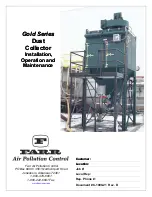
-42-
Model G0850 (Mfd. Since 01/19)
Review the troubleshooting procedures in this section if a problem develops with your machine. If you need
replacement parts or additional help with a procedure, call our Technical Support.
Note: Please gather the
serial number and manufacture date of your machine before calling.
SECTION 8: SERVICE
Troubleshooting
Motor & Electrical
Symptom
Possible Cause
Possible Solution
Machine does not
start or a breaker
trips immediately
after startup.
1. Dust collector not properly connected to
ducting with resistance at the other end.
2. Incorrect power supply voltage/circuit size.
3. Power supply circuit breaker tripped or fuse
blown.
4. Plug/receptacle at fault/wired incorrectly.
5. Remote control not working.
6. Motor wires connected incorrectly.
7. Wiring open/has high resistance.
8. ON/OFF switch at fault.
9. Start capacitor at fault.
10. Remote receiver at fault.
11. Machine overload relay has tripped.
12. Centrifugal switch at fault.
13. Circuit board at fault.
14. Motor at fault.
1. Connect dust collector to ducting with resistance at
the other end (
Page 27).
2. Ensure correct power supply voltage/circuit size.
3. Ensure circuit is sized correctly and free of shorts.
Reset circuit breaker or replace fuse.
4. Test for good contacts; correct the wiring.
5. Replace battery; stay in signal range (
Page 37).
6. Correct motor wiring connections.
7. Check/fix broken, disconnected, or corroded wires.
8. Inspect/replace remote control/control panel.
9. Test/replace.
10. Inspect/replace.
11. Let motor cool, improve ventilation, and reset;
contact tech support if relay frequently trips.
12. Adjust/replace centrifugal switch if available.
13. Ensure circuit board voltage matches power supply;
Inspect/replace.
14. Test/repair/replace.
Machine stalls or is
underpowered.
1. Motor overheated.
2. Dust-collection ducting problem.
3. Canister filter(s) clogged/at fault.
4. Dust collector undersized.
5. Motor wired incorrectly.
6. Run capacitor at fault.
7. Contactor not energized/has poor contacts.
8. Centrifugal switch at fault.
9. Motor bearings at fault.
1. Allow motor to cool, reset overload if necessary.
2. Clear blockages, seal leaks, use smooth-wall duct,
eliminate bends, close other branches (
Page 27).
3. Clean/replace canister filters (
Page 44); wash
canister filters (
Page 44).
4. Move closer to machine/redesign ducting layout/
upgrade dust collector.
5. Wire motor correctly (
Page 46).
6. Test/repair/replace.
7. Test all legs for power/replace if at fault.
8. Adjust/replace centrifugal switch if available.
9. Test by rotating shaft; rotational grinding/loose shaft
requires bearing replacement.
Machine has
vibration or noisy
operation.
1. Motor or component loose.
2. Motor fan rubbing on fan cover.
3. Impeller is damaged or unbalanced.
4. Impeller is loose on motor shaft.
5. Motor bearings at fault.
6. Motor shaft bent.
1. Inspect/replace damaged bolts/nuts, and retighten
with thread-locking fluid.
2. Fix/replace fan cover; replace loose/damaged fan.
3. Inspect impeller for damage/replace.
4. Secure impeller; replace motor and impeller as a set
if motor shaft and impeller hub are damaged.
5. Test by rotating shaft; rotational grinding/loose shaft
requires bearing replacement.
6. Test with dial indicator. Replace motor if damaged.
Содержание G0850
Страница 56: ......



































